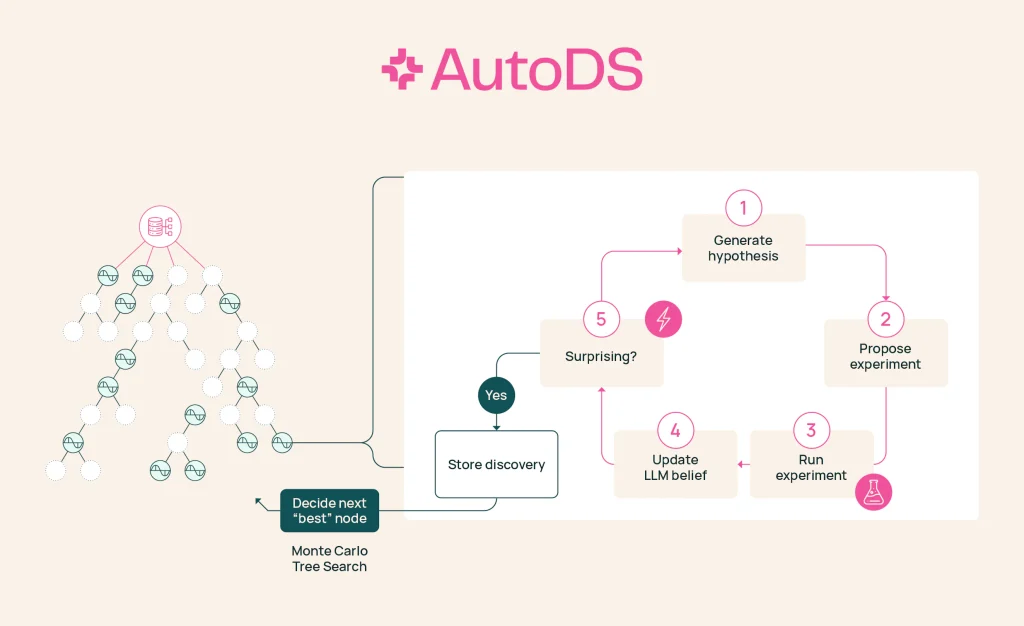The Allen Institute for Artificial Intelligence (AI2) has introduced AutoDS (Autonomous Discovery via Surprisal), a groundbreaking prototype engine for open-ended autonomous scientific discovery. Distinct from conventional AI research assistants that depend on human-defined objectives or queries, AutoDS autonomously generates, tests, and iterates on hypotheses by quantifying and seeking out “Bayesian surprise”—a principled measure of genuine discovery, even beyond what humans specifically look for.

From Goal-Driven Inquiry to Open-Ended Exploration
Traditional approaches to autonomous scientific discovery (ASD) typically revolve around answering pre-specified research questions: generate hypotheses relevant to a given problem, then experimentally validate them. AutoDS departs fundamentally from this paradigm. Drawing inspiration from the curiosity-driven exploration of human scientists, AutoDS operates in an open-ended manner—it decides what questions to pose, which hypotheses to pursue, and how to build upon previous results, all without predefined goals.
Open-ended discovery is inherently challenging, requiring mechanisms for both traversing vast hypothesis spaces and prioritizing which hypotheses merit investigation. To address these challenges, AutoDS formalizes the concept of “surprisal”—a measurable shift in belief about a hypothesis before and after acquiring empirical evidence.
Quantifying Bayesian Surprise via Large Language Models
At the core of AutoDS is a novel framework for estimating Bayesian surprise. For each generated hypothesis, state-of-the-art large language models (LLMs)—such as GPT-4o—act as probabilistic observers, eliciting their “belief” about the hypothesis (in the form of probabilities) both before and after empirical testing. These belief distributions, constructed by sampling multiple judgments from the LLM, are modeled with Beta distributions.
To detect meaningful discovery, AutoDS calculates the Kullback-Leibler (KL) divergence between the posterior (after evidence) and prior (before evidence) Beta distributions—a formal measure of Bayesian surprise. Critically, only belief shifts that cross a threshold of evidential change (e.g., from likely true to likely false) are treated as genuinely surprising, focusing the system on substantive discoveries rather than trivial uncertainty updates.
Efficient Hypothesis Search with MCTS
Exploring the vast hypothesis landscape efficiently requires more than naive sampling. AutoDS leverages Monte Carlo Tree Search (MCTS) with progressive widening to guide its search for surprising discoveries. Each node in the search tree represents a hypothesis, and branches correspond to new hypotheses conditioned on prior findings. This structure lets AutoDS maintain a balance between exploring novel avenues and following up on fruitful leads.
Unlike greedy or beam search methods that risk either overcommitting or prematurely pruning, MCTS sustains high discovery efficiency under fixed computation. Empirically, across 21 datasets from domains such as biology, economics, and behavioral science, AutoDS outperforms repeated sampling, greedy, and beam search baselines—discovering 5–29% more hypotheses judged surprising by the LLM.
A Modular Multi-Agent LLM Architecture
AutoDS orchestrates a series of specialized LLM agents, each responsible for a distinct part of the autonomous scientific workflow:
- Hypothesis GenerationExperimental DesignProgramming and ExecutionResults Analysis and Revision
Deduplication of semantically similar hypotheses uses a hierarchical clustering pipeline: LLM-based text embeddings combined with pairwise semantic equivalence checks ensure the final output set comprises only truly distinct discoveries.
Human Alignment and Interpretability
Alignment with human scientific intuition is a key benchmark. In a structured human evaluation (with reviewers holding MS/PhD-level STEM backgrounds), 67% of the hypotheses AutoDS judged surprising were also seen as surprising by domain experts. Furthermore, AutoDS’s Bayesian surprise metric aligned more closely with human judgment than proxy metrics such as predicted “interestingness” or “utility.”
Interestingly, the nature and direction of surprising belief shifts varied by scientific field—highlighting, for example, that confirmatory claims often require stronger evidence to be convincingly surprising than do novel falsifications.
Practical Considerations and Future Outlook
AutoDS exhibits high implementation and experimental validity, with over 98% of evaluated discoveries deemed correctly implemented by human reviewers. While current pipelines depend on API-driven LLMs and thus face latency constraints, the team also explored a “programmatic search” implementation that delivers much faster, albeit less conceptually rich, results.
Although AutoDS is currently a research prototype (with open-sourcing prospectively planned), its architecture and empirical success chart a compelling path for scalable, AI-driven science.
Conclusion
AutoDS represents a significant advance in autonomous scientific reasoning. By transitioning from goal-driven research to autonomous, curiosity-based exploration—and grounding its search in Bayesian surprise—it points the way toward future AI systems capable of complementing, accelerating, or even independently leading scientific discovery.
Check out the Paper, GitHub Page and Blog. All credit for this research goes to the researchers of this project.
Sponsorship Opportunity: Reach the most influential AI developers in US and Europe. 1M+ monthly readers, 500K+ community builders, infinite possibilities. [Explore Sponsorship]
The post Allen Institute for AI-Ai2 Unveils AutoDS: A Bayesian Surprise-Driven Engine for Open-Ended Scientific Discovery appeared first on MarkTechPost.

